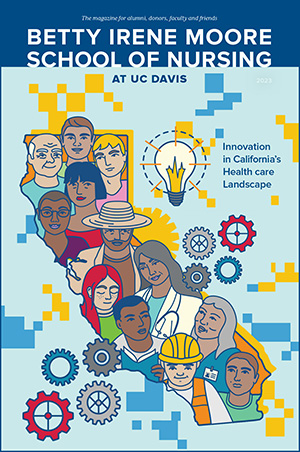Patient-centered SCAlable National Network for Effectiveness Research (pSCANNER)
The Patient-centered SCAlable National Network for Effectiveness Research (pSCANNER) is one of 11 clinical data research networks funded by the Patient-Centered Outcomes Research Institute. Researchers hope to make health data more accessible and usable for the generation of scientific evidence that people, clinicians and other stakeholders use to make more informed health decisions.
School of Nursing Assistant Professor Katherine Kim is one of 24 investigators working at nine data sites with health data of 24 million people. Her current studies include:
Patient-Oriented Scalable National Network for Effectiveness Research (pSCANNER) - Phase I (subaward)
Principal Investigator: Katherine Kim
Funder: University of California, San Diego /Patient-Centered Outcomes Research Institute (PCORI)
Award: $450,433
Period: April 2, 2014, to Oct. 1, 2015
The Patient-Centered Outcomes Research Institute (PCORI) provided funds to create a network of clinical data research networks (PCORnet) to conduct efficient, large-scale, patient-centered comparative effectiveness research. The Patient-Oriented Scalable National Network for Effectiveness Research (pSCANNER) will integrate three existing networks: University of California Research Exchange (UC ReX), Scalable National Network for Effectiveness Research (SCANNER) and VA Informatics and Computing Infrastructure (VINCI). Katherine Kim leads pSCANNER’s patient engagement efforts, which will include the creation of stakeholder advisory panels for the networks three focus conditions: weight management and obesity, heart failure and Kawasaki’s disease.
Patient-Oriented Scalable National Network for Effectiveness Research (pSCANNER) - Phase II (subaward)
Co-investigator: Katherine Kim
Funder: Patient-Centered Outcomes Research Institute (PCORI)
Award: $408,389
Period: Oct. 2, 2015, to Oct. 1, 2018
The Patient-Oriented Scalable National Network for Effectiveness Research (pSCANNER), one of 13 clinical data research networks that comprise PCORnet, has been funded for a second phase. In phase II, pSCANNER will continue to increase capacity to conduct large-scale comparative effectiveness research and will conduct research projects using the network built in phase I. Phase II research will include projects focusing on priority topics identified by pSCANNER’s stakeholder research prioritization panels. The pSCANNER team will continue to engage patients in meaningful ways to ensure that research is truly patient-centered.
HEALTH LEAP: pSCANNER’s Health Systems Leadership Project (subaward)
Subrecipient PI: Katherine Kim
Funder: Patient-Centered Outcomes Research Institute (PCORI)
Award: $62,703
Period: July 1, 2015, to Dec. 31, 2015
HEALTH LEAP builds upon the extensive engagement of patients, clinicians and researchers in research prioritization conducted by pSCANNER. The project extends engagement by incorporating health system leaders into the discussion of health system priorities. Health system leaders also provide direct feedback on the priority research topics identified by the pSCANNER stakeholder research prioritization panels on weight management and obesity, heart failure and Kawasaki’s disease. HEALTH LEAP uses an iterative developmental approach that supports the diversity of participants — patients and patient advocates, clinical leaders and system executives. In-person gatherings, one in Northern California and one in Southern California, will be held to allow for maximum participation of leaders from pSCANNER’s clinical sites and the patient leaders from the current Stakeholder Advisory Board.





